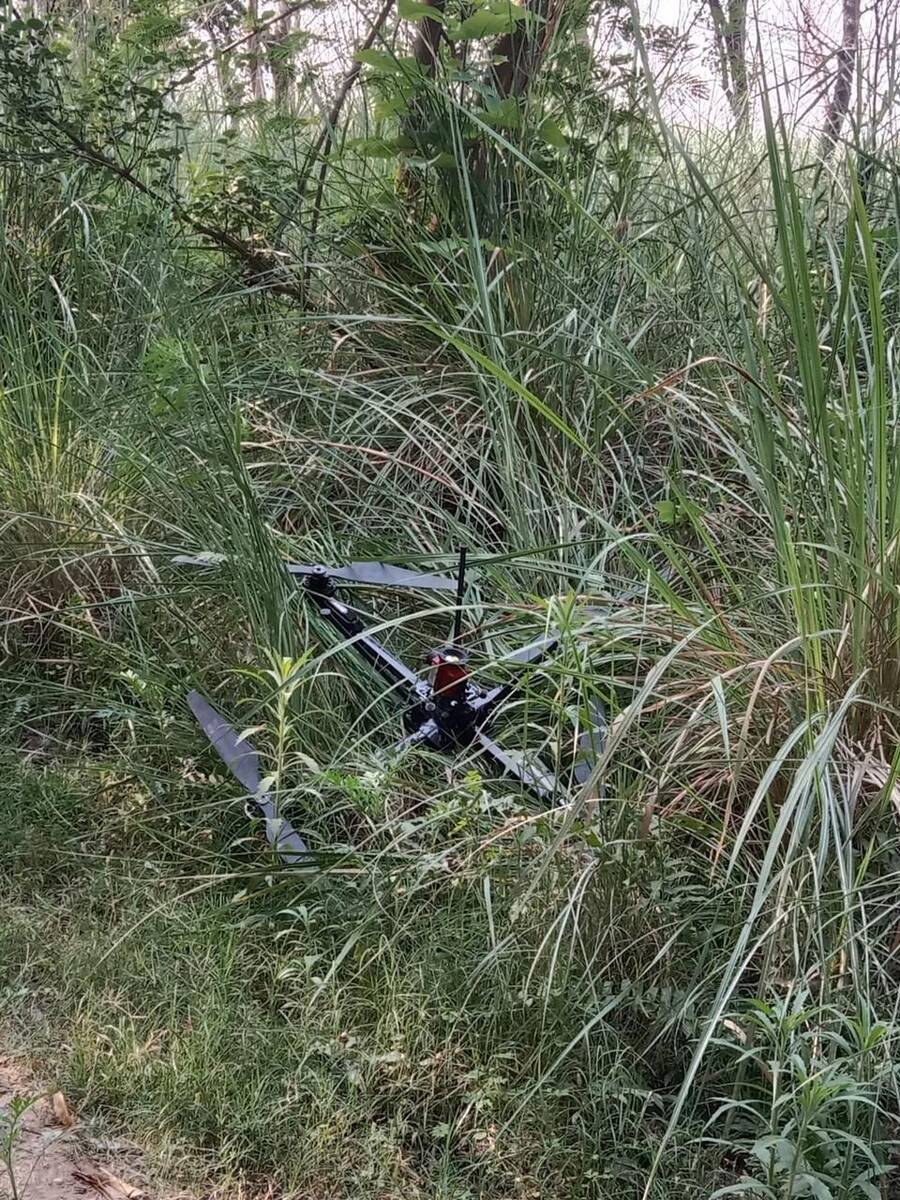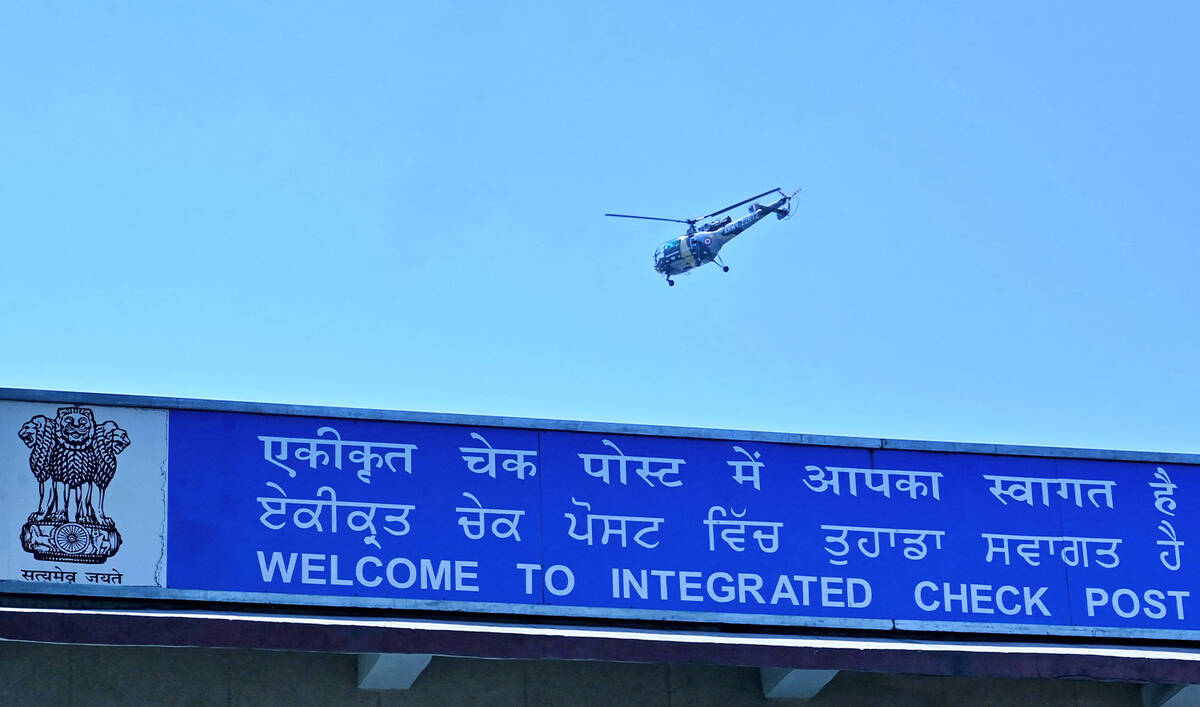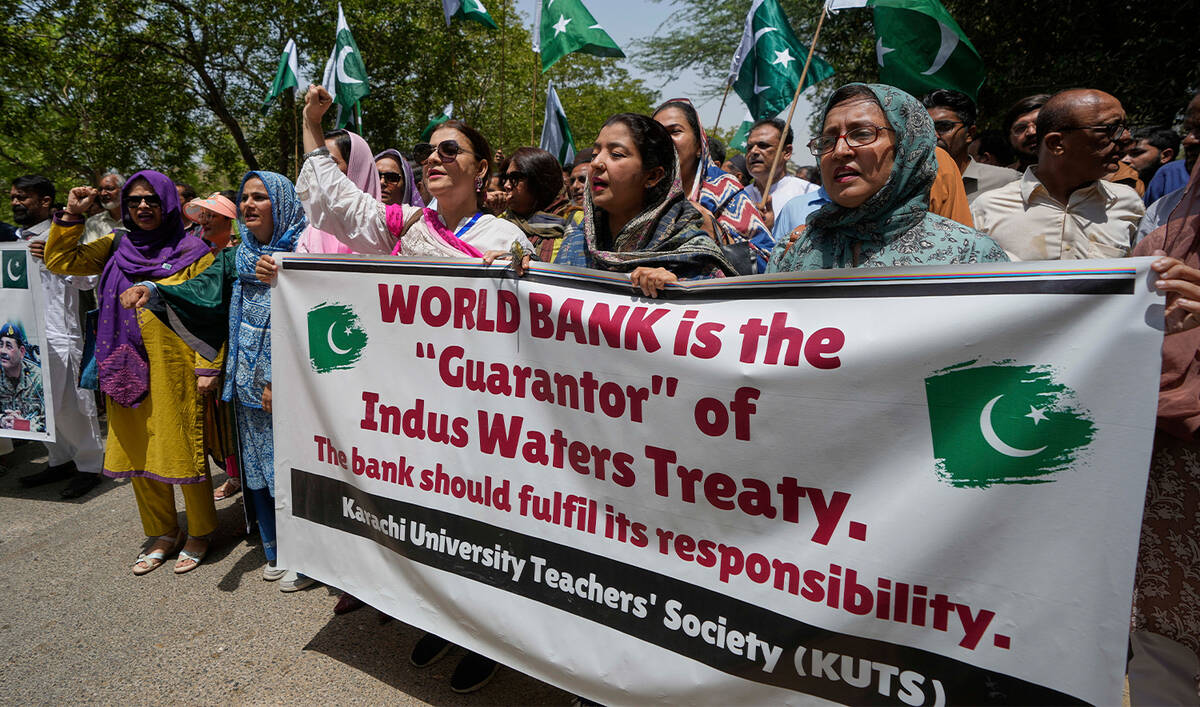ISLAMABAD: Pakistan on Thursday “strongly” condemned and called “reprehensible” the use of electronic devices by Israel to attack Lebanon amid spiraling tensions following mass assaults on Hezbollah communications devices this week.
On Wednesday, hand-held radios used by Hezbollah detonated across Lebanon’s south, with 20 killed, according to Lebanon’s health ministry. Wednesday’s blasts came just a day after pagers exploded simultaneously, killing least 12 and leaving nearly 3,000 others injured on Tuesday.
Hezbollah has vowed to retaliate against Israel, which has declined to comment on the explosions, believed to have been carried out by its spy agency Mossad.
“Pakistan strongly condemns this week’s attacks in Lebanon carried through detonation of electronic equipments,” Foreign Office Spokeswoman Mumtaz Zahra Baloch told reporters.
“Use of cyber and electronic means to commit terrorism in foreign countries is reprehensible.”
She said the attacks showed “Israel’s alarming adventurism in the region,” which was endangering regional peace and security.
“Pakistan reaffirms its support for Lebanon’s sovereignty and territorial integrity and calls upon the international community to take urgent steps to hold Israel to account on its act of international terrorism and violations of international law,” Baloch added.
This week’s operations, which have appeared to throw Hezbollah into disarray, played out alongside Israel’s 11-month-old war in Gaza and heightened fears of an escalation on its Lebanese border and the risk of a full-blown regional war.
“We are opening a new phase in the war. It requires courage, determination and perseverance from us,” Israeli Defense Minister Yoav Gallant said in remarks at an air force base.
The US, which has denied any involvement in the blasts, says it is pursuing intensive diplomacy to avert an escalation of the conflict.
The United Nations Security Council will meet on Friday about the pager blasts after a request by Arab states.
Pakistan condemns Israel’s use of communications devices to commit ‘terrorism’ in Lebanon
https://arab.news/jv6z2
Pakistan condemns Israel’s use of communications devices to commit ‘terrorism’ in Lebanon

- On Wednesday, hand-held radios used by Hezbollah detonated across Lebanon’s south, with 20 people killed
- Wednesday’s blasts came a day after pagers used by Hezbollah members exploded simultaneously, killing 12
Saudi official rejects ‘baseless’ reports Pakistan government sent Hajj funds to wrong account

- News reports claimed Pakistan mistakenly sent Hajj funds for thousands of pilgrims to an account linked to OPEC
- Saudi official says Kingdom’s electronic Hajj platform ensures “highest standards of transparency and accuracy”
ISLAMABAD: An official at Saudi Arabia’s Ministry of Hajj and Umrah on Tuesday rejected reports the Pakistan government had transferred Hajj funds for thousands of pilgrims to the wrong bank account, reiterating that the Kingdom’s electronic Hajj system operated with the “highest standards of transparency.”
Local news outlets this month published reports that Pakistani pilgrims could face delays in the Hajj journey as millions of Saudi Riyals meant for their expenses were mistakenly sent to an account linked to the Organization of the Petroleum Exporting Countries (OPEC) instead of Saudi Arabia’s Ministry of Hajj.
This year’s annual pilgrimage will take place in June, with nearly 89,000 Pakistanis expected to travel to Saudi Arabia under the government scheme and 23,620 Pakistanis through private tour operators. The total quota granted to Pakistan was 179,210, which could not be met.
“Recent claims in some Pakistani media outlets about ‘Hajj funds being sent to the wrong Saudi account’ are baseless and stem from a misunderstanding of the Hajj account management system and the ministry’s official electronic Hajj platform, which ensures the highest standards of transparency and accuracy,” the Saudi official said in a statement.
Pakistani Prime Minister Shehbaz Sharif has formed a committee to investigate why the total Hajj quota granted by Saudi authorities to Pakistan could not be utilized, particularly by private tour operators.
The Saudi official said the Hajj ministry had announced arrangements for this year’s pilgrimage at the end of last year’s Hajj season, emphasizing the importance of adhering to timelines for finalizing contracts and services. In meetings with Pakistan’s religious affairs ministry and private Hajj companies, it was agreed that all contracts would be completed according to the approved schedule.
“While Pakistan’s Ministry of Religious Affairs successfully completed all its pilgrims’ contracts without any notable challenges, a number of Pakistani [private] companies failed to finalize their pilgrims’ contracts within the designated time frame,” the Saudi official said.
“This has been observed in past seasons as well and resulted in the inability to complete entry procedures for these pilgrims to perform Hajj in the Kingdom.”
The Saudi official said it is working in “high-level coordination” with Pakistani authorities to complete Hajj arrangements/.
Pakistan kicked off its Hajj flight operations on Tuesday morning with the first batch of 442 pilgrims departing from Islamabad for Madinah.
Pakistan says shot down Indian ‘surveillance’ quadcopter near Kashmir border

- The incident comes a week after 26 tourists were killed in the Pahalgam area of Indian-administered Kashmir
- India blamed Pakistan, which denied involvement and warned of a ‘befitting response’ to any aggression
ISLAMABAD: Pakistan said on Tuesday it shot down an Indian quadcopter that violated its airspace along the Line of Control (LoC), the de facto border dividing the disputed region of Kashmir, amid growing tensions between the two nuclear-armed neighbors.
The incident comes a week after 26 tourists were killed in the Pahalgam area of Indian-administered Kashmir. India accused Pakistan of orchestrating the attack, though the charge was denied by Islamabad.
New Delhi also suspended key provisions of the 1960 Indus Waters Treaty, with Indian media outlets urging the government to consider military strikes.
Islamabad has warned it would deliver a “befitting response” to any aggression, saying its forces are on high alert to thwart any action from across the border.
“The Pakistan Army thwarted an Indian quadcopter’s violation of airspace along the Line of Control (LoC),” Pakistan’s government said on its official social media account.
“In the Manawar sector of Bhimber area, the enemy attempted to conduct surveillance using a quadcopter, which the Pakistan Army shot down through timely and effective action,” it added.

Earlier, Pakistan’s state media, quoting security sources, reported the military had shot down an Indian quadcopter attempting reconnaissance along the LoC, calling the action a testament to Pakistan’s defensive preparedness.
Tensions have remained high since the April 22 attack in Pahalgam, with Pakistan’s Defense Minister Khawaja Asif warning on Monday the next few days were “crucial” in view of a possible Indian military incursion.
“The threat is there, there is absolutely no doubt about it,” Asif told Geo TV.
“If any attempt was made to cross our geographical borders or if a war was imposed on us, then we are definitely prepared for that and will give a full response,” he added.
Kashmir, a Himalayan region claimed in full by both India and Pakistan but ruled in parts by each, has been a flashpoint between the two countries since their independence in 1947.
The two sides have fought two of their three wars over the territory.
IMF Executive Board to meet on May 9 to review Pakistan’s loan programs

- IMF board’s approval of staff-level agreement with Pakistan will pave the way for disbursement of $1 billion
- Islamabad also secured a new loan program with IMF in March to help build resistance against natural disasters
KARACHI: The International Monetary Fund’s (IMF) Executive Board will meet on May 9 to review its staff-level agreement with Pakistan for an ongoing $7bn bailout program and a new climate resilience loan scheme with Islamabad, the global lender said on its website recently.
The IMF reached a staff-level agreement with Pakistan in March on the first review of the country’s Extended Fund Facility (EFF) and a new $1.3 billion loan arrangement under the Resilience and Sustainability Facility (RSF). Pakistan secured the EFF program last year and deems it crucial to escape a prolonged economic crisis. The staff-level agreement, once approved by the IMF Executive Board, will pave the way for an immediate disbursement of about $1 billion for Pakistan.
The RSF, on the other hand, will support Pakistan’s efforts in building resilience to natural disasters, enhancing budget and investment planning to promote climate adaptation, improve the efficient and productive use of water. It will also help in strengthening Pakistan’s climate information architecture to improve the disclosure of climate risks and align energy sector reforms with mitigation targets.
“May 9, 2025, Pakistan-first review under the extended arrangement under the Extended Fund Facility, request for Modification of Performance Criteria, and request for an arrangement under the Resilience and Sustainability Facility,” the IMF wrote on its website on Friday, disclosing its Executive Board’s schedule.
Pakistan has been prone to natural disasters and consistently ranks among the most severely affected countries in the world due to climate change effects. Unusually heavy rains and melting of glaciers in 2022 triggered flash floods across the country, killing over 1,700 people and inflicting losses over $33 billion.
The IMF program has played a key role in stabilizing Pakistan’s battered economy, which has made some gains in recent months, most notably a reduced inflation rate. The government has said the country is on course for a long-term recovery, while Finance Minister Muhammad Aurangzeb has vowed Islamabad will continue to implement financial reforms mandated by the international lender.
Pakistan secured the $7 billion loan program in September 2024 as it attempted to consolidate its economy since averting a default in 2023. Islamabad has since undertaken several reforms to reduce public debt, maintain low inflation, improve energy sector viability, and accelerate growth.
Pakistan hopes to achieve further economic progress by increasing its exports and attracting foreign investment from regional allies, particularly the Gulf countries. Islamabad has signed memoranda of association (MoUs) regarding trade and investment worth billions of dollars with Saudi Arabia, the United Arab Emirates, Azerbaijan, China and other countries in recent months.
Kashmir attack unites political foes in India, Pakistan

- Analysts say domestically both sides could use the latest diplomatic crisis to generate political gains
- Pakistan’s largest opposition party backed anti-India resolution in Senate, ensuring it passed unanimously
ISLAMABAD: India and Pakistan are exchanging fire over their de-facto border since the Kashmir attack, but in New Delhi and Islamabad political foes are coming together and looking to score points.
On April 22, gunmen killed 26 people in the Indian-administered part of Kashmir, the disputed Himalayan region that has long been a dangerous thorn in relations between the nuclear-armed neighbors.
India accuses Pakistan of backing the perpetrators of the worst attack on civilians in years in Kashmir, an accusation rejected by Islamabad.
In addition to shooting over the Line of Control frontier in Kashmir, the two nations have exchanged diplomatic barbs, expelled citizens and ordered the border shut.
But while the world holds its breath over a possible escalation, analysts said that domestically both sides could use the crisis to generate political gains.
“New Delhi could use it to bolster its image as strong and confident and tough on terror,” said political scientist Michael Kugelman.
“Islamabad could use it to try to rally support for a civilian and military leadership that isn’t terribly popular at home,” Kugelman told AFP.

Pakistani opposition parties have in recent times become more openly critical of the military, which has long been heavily involved in politics and the economy.
But now the fallout of the Kashmir attack has “entirely diverted attention with one common enemy,” Pakistani political scientist Ayesha Siddiqa told AFP.
“When there is a fear of war, people show greater support for the army,” she said.
When the Senate voted on an anti-India resolution last week, jailed former prime minister Imran Khan’s Pakistan Tehreek-e-Insaf (PTI) party voted in favor, ensuring it passed unanimously.
Siddiqa said the party had no other choice or it would have been deemed unpatriotic.
“It is not about being with this installed government or the army, it is about standing against the enemy,” PTI’s spokesman Sheikh Waqas Akram said.
Information Minister Ataullah Tarar echoed the message: “We don’t speak as party members, we speak as Pakistanis.”
Likewise in India, Rahul Gandhi of the Congress party, usually a harsh critic of Modi, made a statement saying that the opposition was united in condemning the attack.
“Whatever steps the government wishes to take, we will fully support them,” Gandhi said.
“The intent behind this attack is to divide society and pit brother against brother,” he added.
“At such a time, it is extremely essential that every Indian remains united and stands together — so that we can foil this conspiracy of the terrorists.”
The youth wing of the Congress party has held rallies, waving the Indian flag and offering their support to Modi.
“I pray to God for the peace of those who lost their lives in this attack,” said Ravi Kumar, a member of the Indian Youth Congress, during a rally on Friday.
He called for “strong and decisive action. The people of the country and the opposition are standing firmly with you.”
Even members of India’s Muslim minority — portrayed as a Pakistani “fifth column” by some in Modi’s Hindu nationalist party — have got behind the government and taken aim at Pakistan.
“Remember, if you go into another country and kill innocent people, no country will remain silent,” said Asaduddin Owaisi, president of the All India Majlis-e-Ittehadul Muslimeen party (AIMIM).
On the Pakistani side, government officials and official media have presented the Kashmir attack as “fake and orchestrated by India.”
This message has been widely shared on social media in Pakistan, where disinformation is rife, has gone down well on the street.
“India is holding us responsible after having executed its own citizens,” said Matloob Inkalabi, a resident of Pakistani Kashmir.
In Islamabad, Waqas Sheikh, a 56-year-old trader, agreed.
“The attack was planned by the Indians, Pakistan has nothing to do with it,” he says, assuring that he “supports the army if India continues its provocations.”

Since the Kashmir attack, Indian police have issued wanted posters for three men — two Pakistanis and an Indian — who they say are members of the Pakistan-based Lashkar-e-Taiba group, a UN-designated terrorist organization.
Modi is “under pressure to deliver,” said Praveen Donthi from International Crisis Group (ICG).
“The public is used to a certain hostile rhetoric when it comes to Pakistan, and they are now begging for blood, they are asking for a military retaliation,” Donthi said.
One killed, 44 injured in oil tanker explosion in southwestern Pakistan

- Oil tanker exploded after it caught fire due to welding work nearby, say police
- Twenty-one injured being shifted to Karachi for treatment, says health official
QUETTA: One person was killed while 44 others were injured in southwestern Pakistan this week when an oil tanker exploded after catching fire, a government official confirmed on Tuesday.
The incident took place at an oil depot in Balochistan province’s Nushki city on Monday afternoon when a tanker filled with fuel caught fire due to welding work nearby, police said. In footage widely shared on social media platforms, dozens of people can be seen fleeing the tanker as it explodes, with thick black smoke and flames leaping into the sky.
Nushki Deputy Commissioner Amjad Soomro told Arab News 44 people standing close to the burning oil tanker were injured after it exploded. Nushki police said the driver of the tanker drove the burning vehicle from the oil depot and parked it in an open field.
“The driver who drove the burning tanker out from an oil depot was killed on the spot,” Soomro told Arab News.
Waseem Baig, the spokesperson for the provincial health department, said 35 people were admitted to the Civil and Bolan Medical hospitals on Monday for burn injuries.
“Twenty-one injured of the Nushki oil tanker explosion are being shifted to Karachi due to severe burn wounds via the army’s C-130 airplane,” Baig said.
Balochistan Chief Minister Sarfraz Bugti expressed grief over the incident, directing authorities to provide immediate and quality medical care to the injured, as per Pakistani newspaper Dawn.
“A complete and transparent investigation into the Nushki incident has been ordered,” Bugti was quoted as saying by Dawn.
Oil tanker explosions can be caused by several factors such as collisions, overheating of the engine or overfilling which can build unnecessary pressure on the tank.
In 2017, 212 people were killed in Pakistan when a tanker carrying 40,000 liters of fuel overturned after trying to make a sharp turn while traveling from Pakistan’s Karachi city to Lahore on a highway.










